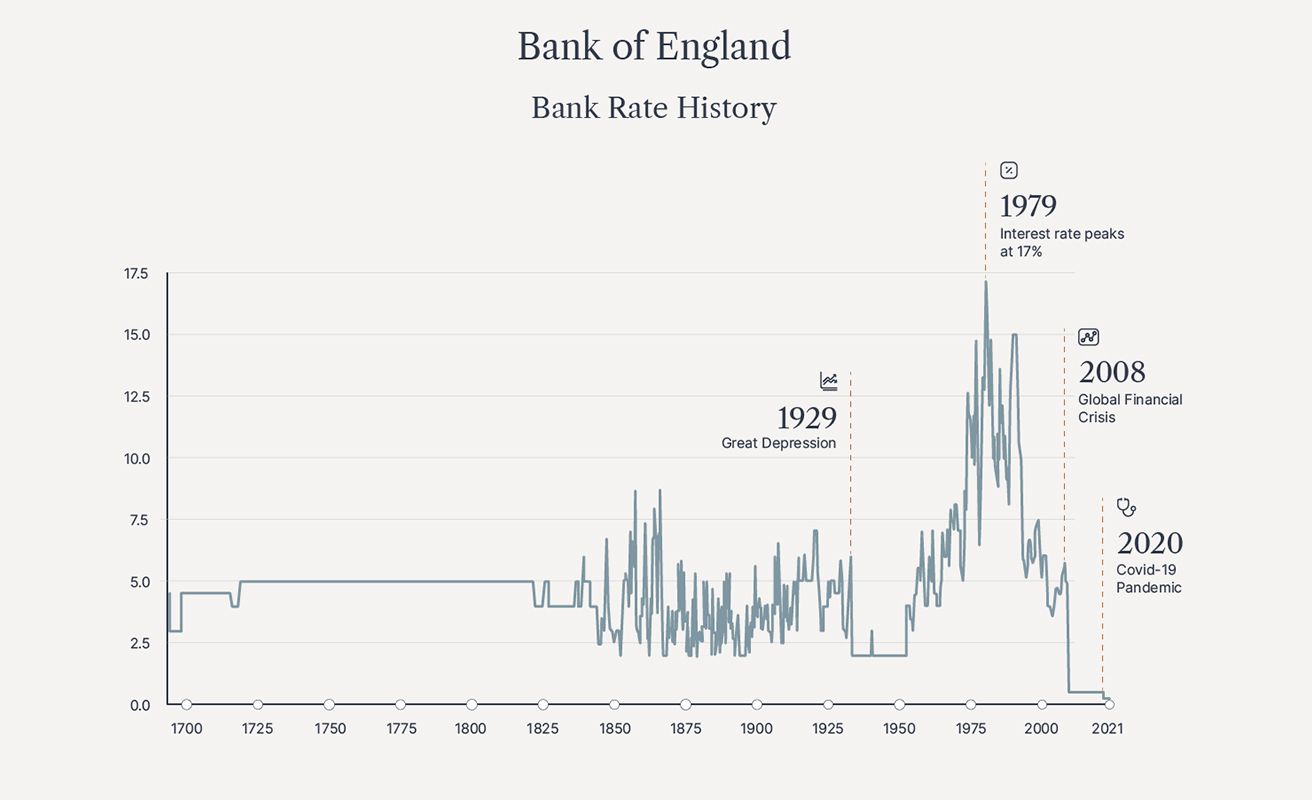
Is now the right time to fix your mortgage rate for longer?
The number of property owners opting for long-term fixed-rate mortgages has increased in recent years due to a combination of low interest rates and heightened economic uncertainty. In this article, our experts explore this trend in more detail and share some of the considerations for those looking to do the same.
Why are more people fixing the rate on their mortgages for longer?
Following the 2008 financial crisis and the impact of Covid-19, the Bank of England cut its key interest rate – the Bank Rate – to just 0.1%, its lowest level in more than 300 years. The central bank has also spent hundreds of billions of pounds buying government bonds to push down borrowing costs throughout the economy.
As widely reported, this has caused many lenders to reduce interest rates on long-term fixed-rate mortgages to historic lows, making these products an increasingly enticing option for homebuyers.
Coupled with continuing economic uncertainty due to the pandemic and economists predicting rising interest rates in the coming years, it's unsurprising that some borrowers want to set their mortgage repayments and avoid fluctuations in their borrowing costs. According to research published last year by the Bank of England, mortgages with long-term fixed interest rates – defined as those with rates fixed for five or more years – accounted for half of new mortgage lending, compared with 30% in 20161.
“We have seen a marked increase in the number of clients who have been taking out long-term fixes for five-year and 10-year terms,” says Lisa Parkes, a Private Banker at Investec. “In 2017, 25% of our mortgage lending was fixed for five years or more. That has increased to 29% so far this year. Also, enquiries about long-term fixed-rate mortgages for up to ten years have increased in recent months as clients expect interest rates to rise so want to lock in lower repayments.”

What are the main benefits of a long-term fixed rate mortgage?
According to Investec’s Chief Economist, Philip Shaw, the most significant advantage of a long-term fixed-rate mortgage – particularly those with 10-year terms – in its predictability.
“You know what you’re going to be paying over a period of 10 years,” he said. “You don’t have any interest rate risk, whereas normally if you have a tracker or a variable rate, repayments will tend to rise and fall with the Bank of England’s Bank Rate.”
Other benefits include avoiding product fees and changes to lending criteria when switching mortgages more frequently.
What are the main risks you should consider?
It’s essential for borrowers to be aware of the potential risks associated with long-term fixed-rate mortgages.
“One of the main disadvantages is that you might be in a position where interest rates fall even further than the rate you’re paying,” explained Philip Shaw. “With this in mind, the decision centres on how much you want to reduce uncertainty over repayments and what your view is on the outlook for rates.”
You may not also be able to take advantage of lower rates that could become available as your equity in your property increases.
Additionally, if during the fixed term you want to make an overpayment to your mortgage above any penalty-free limit allowed by the lender, or even want to pay it off in full, many mortgage providers will charge an early repayment fee.
Therefore, borrowers must ensure they do their homework before committing to a fixed-rate mortgage and fully understand its terms before making a decision.
Could now be a good time to consider fixing for longer?
With interest rates so low, it’s worth evaluating your position now.
“We know that the Bank of England’s Bank Rate is at an all-time low of 0.1%,” says Lisa Parkes. “Around the start of the year, there was speculation that the Bank of England may push the Bank Rate below zero. But as the economic recovery gathered pace, that appears to have been avoided which means current rates are attractive.”
Philip Shaw says he and his team anticipate that if the economy continues to do well, the central bank will begin to pull back from record-low borrowing costs over the coming years.
“While, in our view, it’s too early to raise interest rates or tighten policy more generally now, we do expect that to start in the middle of next year, with the Bank Rate increasing to 0.5% by the end of next year and 1% by the end of 2023,” he says.
Is a fixed-rate mortgage suitable for me?
Traditionally, a fixed-rate mortgage is suitable for those with clarity about their future plans – such as those wanting to buy a long-term family home or an investment property.
However, if you are looking to sell your property to move home or gain liquidity in the near future, then a short-term fix of two or three years could be more suitable.
That said, it’s always important to consider the impact of changes in your circumstances. These might include a change to your income; your overall financial goals and desire to pay off a mortgage or move. Professional mortgage advice can aid your decision-making.
What about overseas buyers and buy-to-let owners?
For buy-to-let owners, mortgage costs will have a direct impact on rental yield, especially following changes to the rules governing the deduction of mortgage interest from tax bills.
“Buy-to-let clients could have greater certainty about their mortgage repayments with a fixed-rate mortgage,” Lisa Parkes adds. “If the rate is relatively low, this enables them to increase their level of return if their rental income increases over time.”
Ongoing travel restrictions mean that many of Investec’s international clients are buying property remotely from overseas. Under these circumstances, international buyers need to factor in foreign exchange (FX) rates when choosing a mortgage. Therefore, working with an FX professional can be crucial to ensure you get the most value from your mortgage.
What flexibility could I get with a fixed-rate mortgage?
Investec’s mortgage solutions are bespoke, which helps us meet our clients’ unique financial needs.
For example, we may be able to combine various fixed mortgage rates that meet short-, medium- and long-term requirements. We could also combine a mixture of fixed and tracker rates. In addition, you may be able to make penalty-free overpayments of up to 10% of the mortgage amount.
In addition, if your income is complex and affected by bonuses, carry and stock, deferred payments or foreign currencies, we have teams dedicated to understanding this complexity who will work with you to find the right solution for your needs.
Of course, it is always essential to seek independent financial advice before making a decision.
1 Why are more borrowers choosing long-term fixed-rate mortgage products? (Bank of England)
For more information about how we can help you with your private banking needs, please get in touch today.
Our Private Bankers are highly experienced with a history in complex lending and relationship management.
Disclaimer:
Your property may be repossessed if you do not keep up repayments on your mortgage. Investec residential mortgages are only available for residential properties in England or Wales and are primarily available to UK residents and subject to eligibility.
Interest rate past performance is not necessarily a guide to future performance. It is advisable to contact a professional advisor if you need financial advice.
Browse articles in


